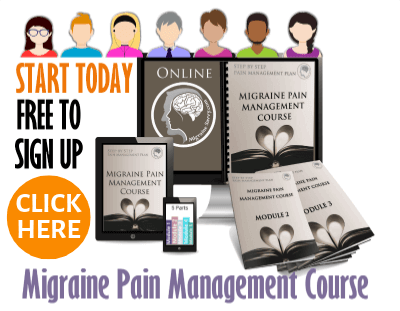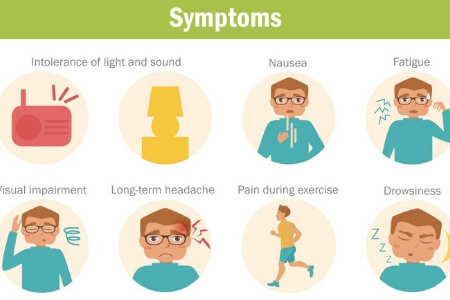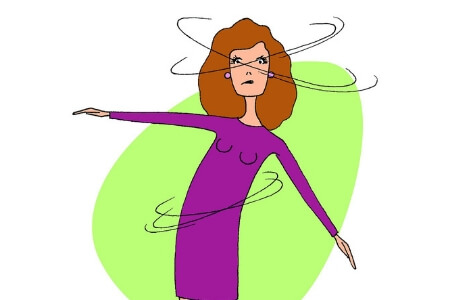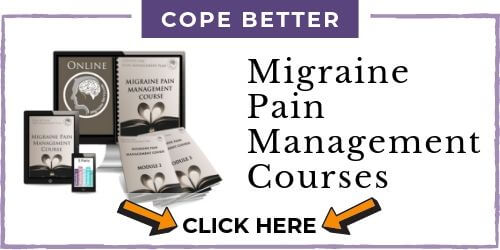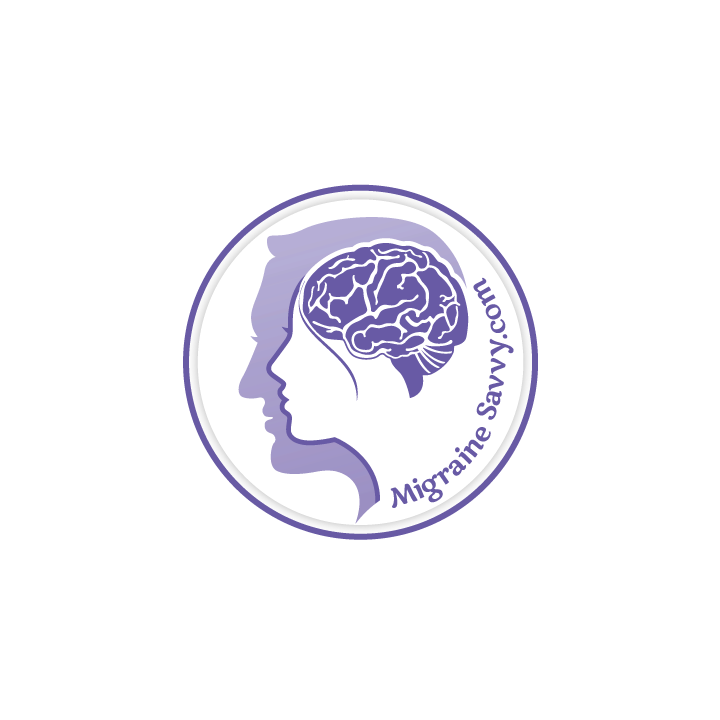- Home
- Migraine Symptoms
- Chronic Migraine Symptoms
GET THE BEST MAGNESIUM
My #1 Choice - Magnesium Breakthrough - Top 7 Forms of Magnesium for Stress and Better Sleep. I personally use this to reduce attacks – nothing else compares.
Chronic Migraine Symptoms: How to Win the Fight
Millions of people live their lives dealing with chronic migraine symptoms. Are you one of them? You must be or you wouldn't be here... reading this article. So, let me ask you...
Do you experience a whole bunch of symptoms all at once, or just one? I will bet you have a few (too many) symptoms to contend with before and during each attack. And after!
After 26 years of having debilitating attacks myself, let me share some tips on how you can get prepared in the hopes of preventing the next one. First - educate yourself on migraine disorder.
It's often difficult for doctors to diagnose migraine because some of the pain symptoms are so similar to other headache conditions and pain syndromes. I thought it would be simple to diagnose.
My #1 Choice in Magnesium Supplements
Simple because migraines recur again and again and headaches go away. Right?
This is not always so... headaches from injury or trauma can also last a lifetime.
The thing that makes the difference is what comes with the headache. The associated symptoms of migraine like: nausea, the cold and flu like symptoms, the sensitivities to light, sound and movement are unique.
For me...
One side of my face swells up when I get a really bad migraine, I just can't see that happening with a headache. So the physical pain symptoms, yes I can see difficulty with that. The tense muscles in the neck and shoulders, pain around the occipital, temples and forehead, and clenched jaw.
But the zig zag lines, the blurry vision, the memory loss and loss of speech... those are definitely chronic migraine symptoms.
No two people are alike and no two migraines are exactly the same. The symptoms can range from mild to severe. Even with some headaches, individuals need to be hospitalized if the pain becomes unbearable. So make sure you write down your symptoms clearly when they happen.
Symptoms can change from attack to attack. So keeping track is important. It will help your doctor diagnose what is going on for you. But more on that in number one below.
If it feels like you are losing the fight... here are some tips.

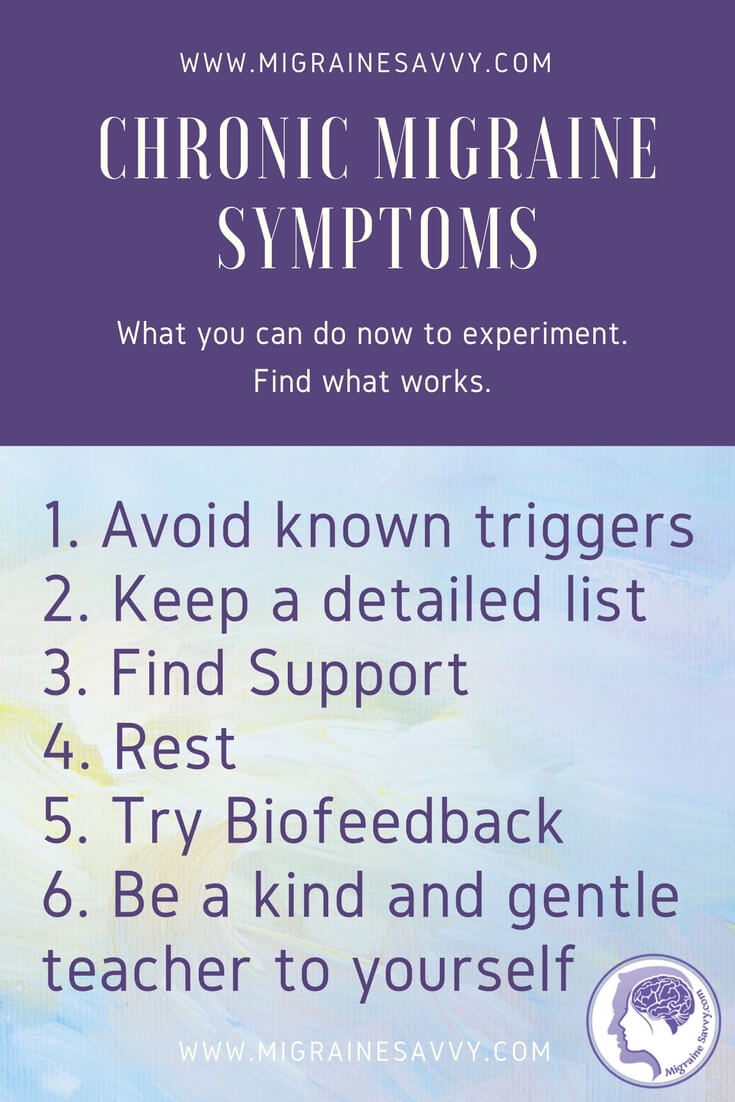 Top Tips for Dealing with Chronic Migraine Symptoms: What You Can Do Now. @migrainesavvy #migraines #headaches
Top Tips for Dealing with Chronic Migraine Symptoms: What You Can Do Now. @migrainesavvy #migraines #headachesWays To Deal With Chronic Migraine Symptoms
Try to avoid all known triggers that cause your migraines. And learn when you need to take action.
You need to act quickly to abort the entire migraine episode... right when you notice your first symptoms. They could be obvious or subtle.
Sometimes you might have to become a detective. I cover this in detail in my migraine pain management course.
And it's essential to know that rest and sleep can help to reduce migraine attacks.
Keeping good records will help you see patterns and see what's working.
It's important to build a support network. Find extra migraine support and be kind to yourself.
This is a medical condition that is just like having epilepsy, so make sure you treat it that way! Seriously!
The
management for chronic migraine symptoms can involve medications,
alternative healthcare options, biofeedback, acupuncture, or any combination of therapies.
#1. Keep Records for Yourself and Your Doctor
The more information that you can write down, the better! Keeping a detailed list of your symptoms and when they occur will increase your chance of an accurate diagnosis.
It will help you and your physician decide on your best possible treatment program.
The treatment of the symptoms such as nausea and vomiting, unilateral pain, sensitivity to light, sensitivity to smell and others can be unique to each person.
Keeping a migraine diary is a good way to be able to gather information in order to figure out what triggers are causing your migraine headaches. Once these triggers can be identified, the best thing to do if possible is to avoid them.
Click here to download and print the PDF for the migraine diary.
#2. Get Some Rest
Rest is very important with finding resolution for a migraine. With some people, the best route is to use the body's natural coping methods, which means closing themselves up in a dark quiet room away from sound and light until the entire episode passes.
If this is not something that worked in the past, then seeking further medical treatment may be necessary. Painkillers, caffeine derivatives or muscle relaxants are often prescribed to help relieve the intense headaches and/or effective triptans and ibuprofen to abort migraines.
You might like to read how to treat a migraine with ice and heat.
#3. Learn Biofeedback
Biofeedback may be beneficial to you. If you can learn to control your headaches by becoming more aware of and changing the body's responses such as heart rate, skin temperature, and muscle tension, it could possibly help.
So you can act faster the more aware you are of your chronic migraine symptoms.
Read more about biofeedback and migraines.
#4. Consider Supplementation
Ask your physician about herbs, vitamins, and minerals to see if they think these might be of help for your migraines. High doses of riboflavin (Vitamin B2) may help prevent migraines because it helps to correct tiny deficiencies in the brain cells.
According to Medline Plus Riboflavin is “possibly effective for...
"Preventing migraine headaches. Taking high-dose riboflavin (400 mg/day) seems to significantly reduce the number of migraine headache attacks. However, taking riboflavin does not appear to reduce the amount of pain or the amount of time a migraine headache lasts.”
Read more about supplements for migraines.
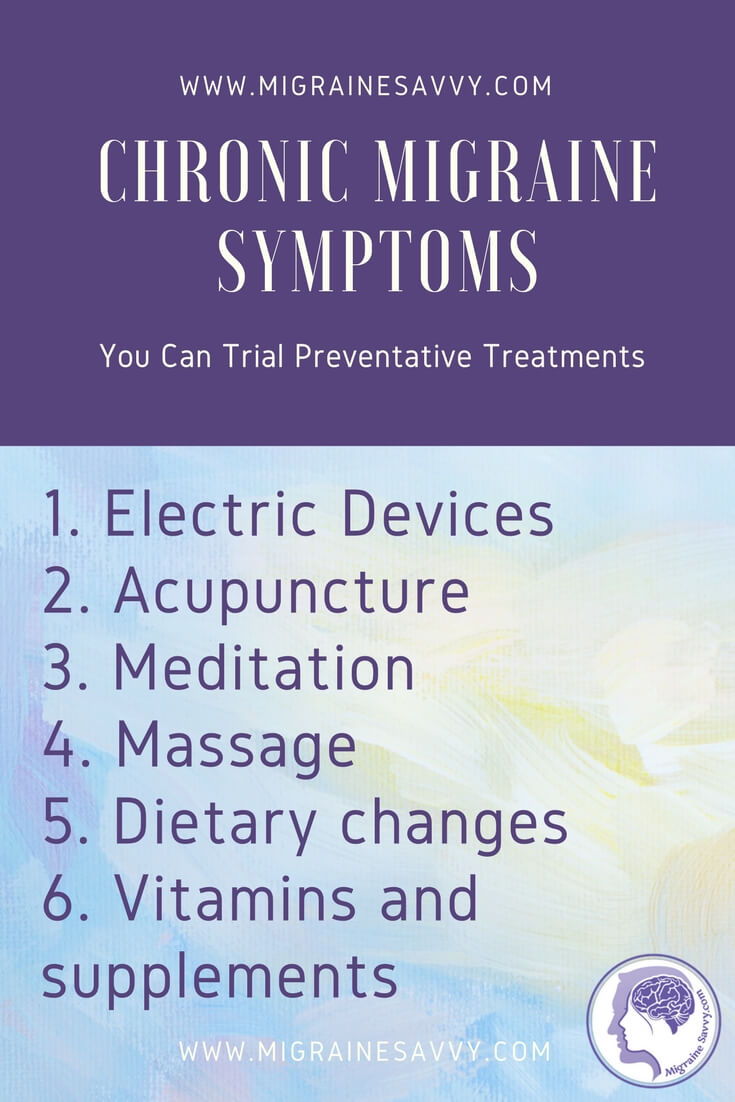 Tips to deal with chronic migraine symptoms using preventative treatments. Take steps to help you get organized and back to your life. @migrainesavvy #migrainessuck
Tips to deal with chronic migraine symptoms using preventative treatments. Take steps to help you get organized and back to your life. @migrainesavvy #migrainessuck#5. Trial Preventative Treatments
Ask your doctor if preventative treatment is an option for you.
Consulting a physician and developing a treatment plan for your migraine headaches is the wisest course of action you can take.
There are times when dietary changes, relaxation methods, massage or acupuncture, works to help prevent migraine attacks.
But unfortunately, as you may already know, some migraines remain resistant to all medications and treatments.
There are some great electrice devices available now that are designed specifically to prevent migraines. Check out these two: Cefaly device and the gammaCore device by clicking on the links.
If your attacks are chronic, then preventative medications might just be the solution.
Read more on migraine prevention and preventive treatments.
#6. Build Up Support
Check out if there are any local support groups close by. They can be helpful and useful to connect with other migraineurs. It will allow you to talk with others that have the same problems and experience the same pain. They will understand exactly what you mean with no blank stares. Heaven!
If you can’t find a group, perhaps consider finding a professional counsellor who specializes in pain management. If you are still having problems coping with the chronic migraine symptoms, a therapist can help you to understand the psychological affects you are experiencing.
Most important of all, is to lift your spirits and set aside time to be with your loved ones and things you love (including yourself) every day.
Learn More in My Course... Module 1 is Free
Coping with migraines can definitely have challenges. So, take back control of your life where you can.
Work with your physician to develop a treatment plan that will work for you.
I can highly recommend getting my pain management course. It's free to enroll and I go over everything step by step.
Module 2 has a lot of the counseling and coping tools I use with my clients.
If you prefer face to face counseling, instead of working things through on your own, I also suggest finding a good pain counselor.
When you are dealing with chronic migraine symptoms, you can approach it from all sides. And remember... acting fast to stop the entire migraine process will also reduce your symptoms.
Take care of yourself, and be kind to yourself. This is a hard journey.
Until next time, be well and be pain free,
Hx
WANT MORE TIPS? Subscribe to my newsletter and follow along on Facebook and Pinterest for all of the latest updates.
MIGRAINE SYMPTOMS Related Articles
How to be more MIGRAINE SAVVY right now...
Chronic Migraine Symptoms Reference:
1. Medline Plus Riboflavin – Vitamin B2


